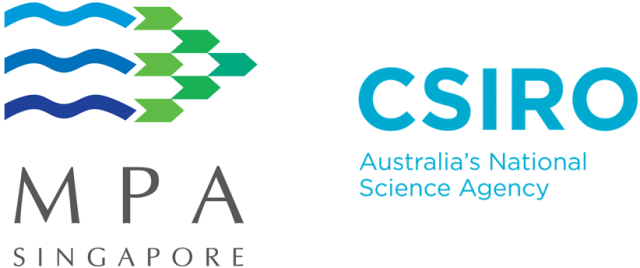Singapore Maritime Week: decarbonizing shipping with Australia and other key partners
By Julian Atchison on March 31, 2025
MPA Singapore, CSIRO fund key R&D projects

Click to learn more. MPA Singapore and CSIRO announced funding for eight R&D projects, including ammonia safety training, and an AI-based safety management system.
On behalf of the governments of Australia and Singapore, the Commonwealth Scientific and Industrial Research Organisation (CSIRO), and the Maritime and Port Authority of Singapore (MPA) have selected eight R&D projects to be completed in the next two years. The projects are part of the Australia-Singapore Initiative on Low Emissions Technologies (ASLET), supporting the establishment of a Singapore and Australia Green and Digital Shipping Corridor. A total of 32 applications were received from universities, research institutes and industry based in Australia and Singapore, and the eight selected will cover a range of decarbonization activities, including:
- Ammonia safety training program for maritime and port operations, led by the University of Tasmania and TasRex. This project will design, develop and pilot a safety and training program on the use of ammonia as a fuel for maritime and port personnel.
- And development of an AI-based integrated system for safe management of ammonia and hydrogen fuels in the maritime sector, led by the National University of Singapore. The project involves developing an intelligent, distributed fibre optic system that will be deployed to monitor fuel pipelines for leaks, utilising real-time sensing of temperature, strain, and acoustic signatures.
ASLET will also invest in a national testbed for ammonia-powered energy systems at CSIRO’s site in Newcastle, NSW (the location for AEA’s 2023 APAC Conference). The facility will be designed, installed and commissioned through 2025, and will be available to users in 2026.
Cooperation agreements with key players, first methanol bunkering license
The Singapore Maritime Week event also saw a series of agreements signed between MPA Singapore and a number of key players, including:
- American Bureau of Shipping, with a plan to establish the “ABS Singapore Maritime Safety Centre”. Professionals and students will have the opportunity to learn and acquire skills in the safe handling of alternative fuels, such as ammonia and methanol.
- Plans to conduct further studies and trials for the bunkering of bio-methane, methanol and ammonia in conjunction with the Port of Rotterdam.
- A new commitment to establish a green shipping corridor with the Port of Antwerp-Brugges.
- A similar partnership with the Indian government.
- Renewal of an existing partnership with Wärtsilä, which will see deployment of the “Ammonia Power and Control (PAC) simulation model”, a digital tool to improve safety and operational efficiency onboard ammonia-powered vessels.
Also at the event, MPA Singapore indicated that it has contributed proposal draft training guidelines for the safe handling of methanol and ammonia at the IMO, based on its own work. Seafarer training requirements is an issue that has swung sharply into focus at the IMO this year. The event also marked the opening of applications for Singapore’s first methanol bunkering license.